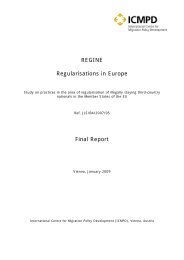taxud/2414/08 - European Commission - Europa
taxud/2414/08 - European Commission - Europa
taxud/2414/08 - European Commission - Europa
Create successful ePaper yourself
Turn your PDF publications into a flip-book with our unique Google optimized e-Paper software.
tokens issued by businesses to encourage consumer loyalty, for example bonus vouchers,<br />
collectable points which can be exchanged against goods or services, etc.;<br />
(ii) supply of securities<br />
Under Article 135a (8) of Directive 2006/112/EC "supply of securities" means the supply<br />
of tradable instruments other than an instrument establishing title to goods or to the rights<br />
referred to in Article 15(2), representing financial value and reflecting any one or more<br />
of the following:<br />
(a)<br />
(b)<br />
an equity ownership position in a company or other association;<br />
a creditor's position for debts;<br />
(c) unit ownership in undertakings for collective investment in the securities referred<br />
to in points (a) or (b), in other exempted financial instruments referred to in points (a) to<br />
(d) of Article 135(1) or in other undertakings for collective investment;<br />
This provision is complemented by Article 9 of the Regulation which provides for the<br />
following:<br />
The definition of the "supply of securities" provided for in point (8) of Article 135a of<br />
Directive 2006/112/EC shall cover the provision of at least the following:<br />
(1) equity securities, including shares;<br />
An equity security is a share in the capital stock of a company (typically common stock,<br />
although preferred equity is also a form of capital stock). The holder of equity is a<br />
shareholder, owning a share, or fractional part of the issuer. Equity securities are not<br />
entitled to any payment. In bankruptcy, they share only in the residual interest of the<br />
issuer after all obligations have been paid out to creditors. However, equity generally<br />
entitles the holder to a pro rata portion of control of the company, meaning that a holder<br />
of a majority of the equity is usually entitled to control the issuer. Equity also enjoys the<br />
right to profits and capital gain and equity holders are entitled to the "upside" of the<br />
business and to control the business. A share is one of a finite number of equal portions<br />
in the capital of a company, entitling the owner to a proportion of distributed, nonreinvested<br />
profits known as dividends and to a portion of the value of the company in<br />
case of liquidation.<br />
(2) instruments recording the promise of repayment of a debt, including debentures,<br />
bonds and corporate bonds, promissory notes, Euro debt securities and other<br />
tradable commercial papers;<br />
Debt securities typically require regular payments (interest) to the holder, equity<br />
securities are not entitled to any payment. Holders of debt securities receive only interest<br />
and repayment of principal regardless of how well the issuer performs financially.<br />
Furthermore, debt securities do not have voting rights outside of bankruptcy. They exist<br />
in various forms:<br />
31
















